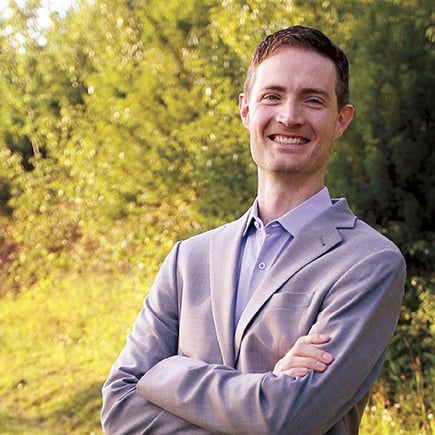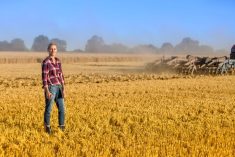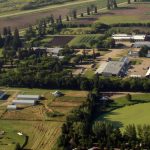Agriculture already has so many buzz phrases meant to show you’re smart. There’s “Do more with less,” there’s “Work on the business, not in it,” and, of course, there’s “What got you here today won’t get you to where you want to go tomorrow.”
It isn’t that they’re wrong. It’s that they’re too much like cliches and not enough like actual business strategies.
So let’s skip the jargon and get down to brass tacks. One of the hottest topics in farming today is, “What’s your mindset?”
Read Also

How scientists are using DNA and climate data to breed crops of the future
A method for forecasting how crops will perform in different environments so that plant breeders can quickly select the best parents for new, climate-resilient varieties.
Are you the farm manager or are you its CEO? Or, to get right to the point, should the way you approach your own role be the next big pivot for your farm? If you say yes, would this have more positive impact than anything else you can do?
A small but growing segment of Canada’s farmers are looking beyond. You ask, “beyond what?” The best way to answer that may be to come along and meet one farmer whose name you have already heard, and who you may already have an opinion about. Then let’s look at how he has embraced the corner office mindset, asking him to show us how he transformed his family farm into a polished business.
Lucky for us, it isn’t that hard an invitation to get, because Kristjan Hebert wants everyone to replicate his model, so he’s willing to teach you how to do it, too.
So let’s start at ground zero. Hebert still knows how to roll up his sleeves and get dirt under his nails. Truth is, though, a lot of us would say he’s a lot more likely to wear out the backsides of his pants than the palms of his workgloves.
Hebert doesn’t mind the joke. In fact, he likes it. Everything he does — and everything he chooses not to do — is by design and is given serious thought. Even the name of his company—Hebert Group and the name of his farm, Hebert Grain Ventures (one of Hebert Group’s many business streams) should provide clues that he approaches business very differently than the usual farm model.
When he graduated from the University of Saskatchewan with a commerce degree in 2004, Hebert spent four years articling with MNP to become a CPA before heading back to the family’s 4,000-acre operation, a farm that Hebert had dubbed The Monster because of the toll it took on his father, Louis.
Hebert’s dad farmed in an era that rewarded hard work. By the time Hebert returned to the farm, he, like many in his generation, had no intention of breaking his back 18 hours a day. Instead, he was geared up to implement heaps of changes fresh in his mind from school and MNP.
“Honestly, it was the business side that brought me home more than anything,” he says. “It became more of a human resource — a team and people — business. That’s the part where I saw lots of opportunity.”
One of the first things he did was to expand the farm, nearly tripling it over the next decade to 11,000 acres of owned and rented land. As well, not long after landing back home he enrolled in The Executive Program for Agricultural Producers (TEPAP) at Texas A&M University, a very popular, unofficial ag MBA for farmers.
It was there he absorbed the risk management ideas of founder Danny Klinefelter. The program “stretched my mind with ideas,” says Hebert. “I wasn’t going to choose every one of those as an opportunity, but it stretched my mind with ideas in order to narrow it down to the opportunities that actually work in my system, and not to limit myself with the way I was currently thinking.
“Danny made me comfortable with thinking outside the box and being different than the norm in agriculture.”

It was also at TEPAP where Hebert got introduced to Klinefelter’s five per cent rule and the core belief that if you improve everything on the farm by five per cent — i.e. spend five per cent less on inputs but also get a five per cent yield boost — your net gains will grow much faster than five per cent per year.
After incorporating TEPAP’s ideas, Hebert then moved onto Strategic Coach in 2017. Membership in this Toronto-based business and life coaching program for entrepreneurs sees Hebert regularly fly to the Big Smoke to spend a couple of days with fellow business owners, the vast majority of whom do not work in agriculture. There, they work out business issues, talk strategy and get to the bottom of how to achieve their goals by getting the absolute most out of their teams.
“Business is business,” Hebert says. “It doesn’t matter what industry you’re in, it’s the exact same. And if you learn how to manage money and people and time, then you can manage any business.”
When Hebert talks about the farm and how it runs, you would half-think he was describing some downtown office building. Terms such as bonus structures, profit sharing and pension plans aren’t always associated with family-owned farms. But then again, not everyone is on the leading edge of farm management.
It was at a Strategic Coach session that he met influential businessman and author Gino Wickham, who penned the 2012 book Traction: Get a Grip on Your Business, which has become Hebert’s business handbook for how the farm runs. The book’s central focus is EOS, or the Entrepreneurial Operating System, and its dust jacket asks: Do you have a grip on your business or does your business have a grip on you?
Hebert has worked hard to make certain he is on the right side of that answer. “We implemented EOS and that really is the underlying system that our business (is) riding on,” he says.
The half-dozen components of EOS are: vision, people, data, issues, process and traction, and, as at Hebert Grain Ventures (HGV), key business tools include accountability charts and clear divisions of who does what, all feeding into weekly, monthly and quarterly goals.
The entire farm’s culture is much more horizontal than vertical, though. More like a hockey team, Hebert says.
“Hierarchy on a sports team is just the coach as the boss and then the captains,” he says. Of the captains, he says, “They’re not necessarily more skilled, they’re just way better at communicating. So, we run a very flat kind of sports team culture.”
It takes time to get your head around it, but it also changes the entire farm team’s approach to work, so Hebert switches to a comparison of his farm with how a construction firm operates.
“You have X number of projects to get done during the year. Some are really big, like seeding and harvest … some are really small,” he says. But each is a project and needs to be treated that way.
The environment at HGV has allowed for lots of positive change. Currently, the farm is 30,000 acres with 10 to 12 full-time staff and minimal part-time help. Impressively, Hebert says he makes the hire and then finds the work, although he knows this is opposite to most farms.

It’s all about whether the person is right for the culture, which is why an employee has to take a personality test before they are ever allowed to climb into a tractor cab or spin a wrench.
“If someone good applies, we hire them and then we find the work after. It’s been a while since we’ve been understaffed. We’ve kind of had success at doing it, but I mean, we put a fair bit of effort into finding and attracting those kinds of people.”
Hebert also seems to have cracked the code on attracting top-rate talent, a problem that plagues most farmers. He made a purposeful decision to get into social media. Between being active on most platforms, Hebert also does a good amount of public speaking throughout the year to farm groups and their members. He says every time he makes a presentation his farm gets multiple resumés from people willing to relocate to Moosomin simply because the collective team he has created is so attractive.
As well, most of their foreign workers (often seasonal labour) have been found through social media. He says there is pushback from those in the Canadian farming online community, but he doesn’t care. He has what he deems to be a high performance set of people, and that’s what matters.
“Our team has been chosen because they all have kind of the same philosophy as us, and that is, we’re addicted to the game. Our game just happens to be production agriculture,” says Hebert. “When I was 10 years old, nobody had to beg me to get up at 6:30 a.m. to go play hockey. I did it because I loved it, and that’s what we’re trying to create here.”
The company’s largely egalitarian setup lets everyone be heard, too. The two most recent expansions — in 2019 and 2021, a total of about 14,000 acres — was voted on by all employees. Hebert refused to make the decision alone, even though he could have.
Hebert isn’t perfect, and he recognizes that and makes room for open reviews of how he is performing. His CFO and COO hold meetings three times per year with each employee — and without Hebert in the room — to understand what the farm needs, or doesn’t need, and to look at any potential solutions.
“I’m not out there every day anymore, so how can I have those ideas?” he asks. “I don’t know which decisions are making life hard or better … We foster innovation and ideas to come forward.”
It’s easy to see how those ideas are performing once they are set in motion, as well. Hebert has an endless array of dashboards on his computer that update him on 15 key metrics that are constantly being measured, including financial, human and operational.
He tracks overtime hours, 16-plus hour days, hours worked per acre, percentage of grain sold, hauled and more. A Friday report shows him the week’s progress and arms him with talking points for the staff-wide Monday meeting. Aside from monitoring the data, Hebert spends one to two hours a day on strategy and marketing, which is in addition to legal, accounting and other areas of the business that need his attention.
“I’ll still go get dirty if it’s required and if I’m the best one at it, but my COO and I have put together a team of people that are a lot better than I am at a lot of those jobs. I take more pride in the job getting done and the business running well than I do doing it myself now.”
It became clear that he wasn’t alone in wanting to “get” things right outside of financials, either. He hired one of his best friends, Evan Shout, a fellow CPA, to be the CFO of HGV in 2019. Shout had seen firsthand during his time at MNP and in consulting via Maverick Ag (his and Hebert’s consultancy) that farmers aren’t only worried about money. They have a raft of other, “softer” issues that keep them up at night too.
The duo realized there was both a gap that needed filling, and the result is Farmer Coach (read ‘Back to school’ below).
Back to school
Prairie farmers often have cows as a secondary source of income. At Hebert Group, they have a consultancy.
You might say it’s the same but different.

The way Hebert and COO Evan Shout differentiate Farmer Coach in their own minds is clear. It’s to give farmers a way they can stop looking at their farm as something they have to work at, making it instead something they manage and leverage to their benefit.
The idea is that the farm is a gateway to bigger and better things, whatever those things are, and the way to unlock those bigger and better things is by supercharging the farmer’s understanding of business and all associated practices.
The curriculum, developed by Hebert and Shout, aims to be laser-focused and relevant. The first 30-person cohort began in November 2022 and just graduated this past summer. The new intake has begun for both first- and second-year farmer students. The plan is that whether they’re young, old, small-farm or mega-farm … none of these make a difference at Farm Coach. Here, it’s about your mindset.
“We know that Farmer Coach isn’t for everybody,” Hebert says. “We’re completely fine with that.”
Hebert and Shout aren’t professional curriculum builders. Materials are created weeks, not years, in advance, and like everything happening at GHV, it’s intentional. “A lot of the curriculum is built live with what’s relevant and what we’re seeing in the industry and from our clients,” says Hebert.
Only weeks before the 2023 fall intake began, final curriculum was printed to offer the most up-to-date materials for farmers.
Three times per year, the cohorts meet in Saskatoon, Sask., 1.5 days at a time, being taught and teaching others in group work. Take-home work fills in the gaps between sessions.
The first-year students start their course work by defining success in their own terms. Although a simple exercise, it has yielded powerful results.
Farmers then dig into numerous areas inside and out of their own farm with either new or revisited plans for each section, including Labour and Human Resources, Working Capital and Cash Flow, Communication and Self Management and Work/Life Balance. They also create team accountability charts, demonstrate they can calculate key financial ratios, and dive deep on working capital and cash flow.
For the returning second years, the job is to revisit their definition of success and set their sights even higher, creating and implementing strategic operating procedures, gross margin analysis and crop rotation planning based on finance. They must make strategies around internal and external risk mitigation, understand debt analysis, and look into transition planning and how that will look, no matter what stage of their career.
Hebert’s goal for returning farmers was to retain 80 per cent of year one farmers. To date, he says, it’s running at 90 per cent.
– This article was originally published in the December 2023 issue of Country Guide.
















